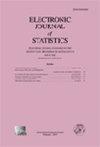Posterior contraction and testing for multivariate isotonic regression
IF 1.3
4区 数学
Q3 STATISTICS & PROBABILITY
引用次数: 2
Abstract
We consider the nonparametric regression problem with multiple predictors and an additive error, where the regression function is assumed to be coordinatewise nondecreasing. We propose a Bayesian approach to make an inference on the multivariate monotone regression function, obtain the posterior contraction rate, and construct a universally consistent Bayesian testing procedure for multivariate monotonicity. To facilitate posterior analysis, we set aside the shape restrictions temporarily, and endow a prior on blockwise constant regression functions with heights independently normally distributed. The unknown variance of the error term is either estimated by the marginal maximum likelihood estimate or is equipped with an inverse-gamma prior. Then the unrestricted block heights are a posteriori also independently normally distributed given the error variance, by conjugacy. To comply with the shape restrictions, we project samples from the unrestricted posterior onto the class of multivariate monotone functions, inducing the"projection-posterior distribution", to be used for making an inference. Under an $\mathbb{L}_1$-metric, we show that the projection-posterior based on $n$ independent samples contracts around the true monotone regression function at the optimal rate $n^{-1/(2+d)}$. Then we construct a Bayesian test for multivariate monotonicity based on the posterior probability of a shrinking neighborhood of the class of multivariate monotone functions. We show that the test is universally consistent, that is, the level of the Bayesian test goes to zero, and the power at any fixed alternative goes to one. Moreover, we show that for a smooth alternative function, power goes to one as long as its distance to the class of multivariate monotone functions is at least of the order of the estimation error for a smooth function.后缩和多元等张回归的检验
我们考虑了具有多个预测因子和一个加性误差的非参数回归问题,其中假设回归函数是协调不递减的。我们提出了一种贝叶斯方法来推断多元单调回归函数,获得后验收缩率,并构造了多元单调性的普遍一致贝叶斯检验程序。为了便于后验分析,我们暂时搁置了形状限制,并赋予逐块常数回归函数的先验高度独立正态分布。误差项的未知方差要么通过边际最大似然估计来估计,要么配备有逆伽马先验。然后,在给定误差方差的情况下,通过共轭,不受限制的块高度是独立正态分布的后验。为了遵守形状限制,我们将来自非限制后验的样本投影到一类多元单调函数上,从而导出“投影后验分布”,用于进行推理。在$\mathbb下{L}_1$-度量,我们证明了基于$n$独立样本的投影后验在最优速率$n^{-1/(2+d)}$下围绕真单调回归函数收缩。然后,基于一类多元单调函数收缩邻域的后验概率,构造了多元单调性的贝叶斯检验。我们证明了该测试是普遍一致的,也就是说,贝叶斯测试的水平为零,任何固定备选方案的功率为一。此外,我们证明了对于光滑的替代函数,只要它到多元单调函数类的距离至少是光滑函数的估计误差的阶数,幂就等于1。
本文章由计算机程序翻译,如有差异,请以英文原文为准。
求助全文
约1分钟内获得全文
求助全文
来源期刊

Electronic Journal of Statistics
STATISTICS & PROBABILITY-
CiteScore
1.80
自引率
9.10%
发文量
100
审稿时长
3 months
期刊介绍:
The Electronic Journal of Statistics (EJS) publishes research articles and short notes on theoretical, computational and applied statistics. The journal is open access. Articles are refereed and are held to the same standard as articles in other IMS journals. Articles become publicly available shortly after they are accepted.
 求助内容:
求助内容: 应助结果提醒方式:
应助结果提醒方式:


